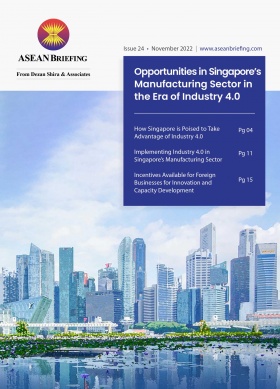A Guide to Taxation in Cambodia
The Law of Taxation is the principal taxation law in Cambodia, and taxpayers must submit and pay their taxes to the General Department of Taxation (GDT) annually and monthly.
Most businesses will be affected by the following taxes:
- Corporate income tax;
- Minimum tax;
- Value-added tax;
- Withholding tax; and
- Personal income tax.
Corporate income tax
Cambodia’s standard corporate income tax (CIT) rate is 20 percent, which is implemented through a self-assessment regime.
There are three classes of taxpayers:
- Small taxpayers;
- Medium taxpayers; and
- Large taxpayers.
Taxpayer Classification Based on Annual Turnover
|
Taxpayer classification |
Criteria |
|
|
Prakas 025 |
Prakas 009 |
|
|
Small |
|
|
|
Medium |
|
|
|
Large |
|
|
Under Prakas 009, the General Department of Taxation also has the authority to re-determine the classification of a taxpayer based on the value of their assets if the declared turnover does not reflect actual turnover.
Taxpayer Classification Based on Annual Value of Assets
|
Taxpayer classification |
Value of assets |
|
Small |
|
|
Medium |
|
|
Large |
|
Business entities engaged in oil and natural gas production and the exploitation of natural resources will be subject to a 30 percent CIT rate. Entities engaging in Qualified Investment Projects (QIP) will generally pay a zero percent rate.
Minimum tax
The minimum tax is imposed on taxpayers who maintain improper accounting records. The minimum tax due is equal to one percent of total turnover, except value-added tax (VAT), irrespective of whether the taxpayer is in a profit or loss situation.
Value-added tax
VAT is levied on goods and services as well as the sales of fixed assets. The standard rate is 10 percent although some businesses are eligible for zero percent VAT if they engage in activities that support exporters. These include the garment, textile, and footwear industries.
Withholding tax
Withholding tax applies to both resident and non-resident companies in Cambodia. There is no withholding tax on dividends paid to resident companies, whereas non-residents will pay a 14 percent rate. The tax rate on interest, royalties, and fees for technical services is 15 percent for resident companies and 14 percent for non-resident companies.
|
Nature of income |
Tax rate (%) |
|
|
Residents |
Non-residents |
|
|
Dividends |
0 |
14 + Advance tax on dividend distributions (ATDD) |
|
Interest |
15 |
14 |
|
Royalties |
15 |
14 |
|
Fees for technical services |
15 |
14 |
Personal income tax
Cambodia does not impose personal income tax per se, instead, there is a tax on monthly salaries imposed on individuals who derive income from the country. The term salary also includes, in addition to wages, remunerations, bonuses, and other fringe benefits.
Resident employee is taxed on their worldwide sources of income whereas non-residents are taxed on Cambodia-sourced income.
An individual is considered a resident in Cambodia if they domicile in the country or are in Cambodia for more than 182 days in any 12-month period.
New income tax thresholds for 2023
Cambodia has introduced new income tax thresholds for 2023 under Sub-Decree 196. The decree will determine the taxable income earned by physical persons, sole proprietorships, and the distributive share of partners in a partnership, as well as for determining the monthly taxable salaries received by resident employees.
The new thresholds will come into effect from January 1, 2023.
New annual income tax thresholds for physical persons, sole proprietorships, and partnerships
|
Threshold of income subject to annual tax |
Tax rate (%) |
|
0 riel to 18,000,000 riel (US$4,344) |
0 |
|
18,000,001 riel (US$4,345) to 24,000,000 riel (US$5,739) |
5 |
|
24,000,001 riel (US$5,795) to 102,000,000 riel (US$24,629) |
10 |
|
102,000,001 riel (US$24,625) to 150,000,000 riel (US$36,214) |
15 |
|
Over 150,000,000 riel (US$36,214) |
20 |
New monthly tax thresholds on income for salaries received by resident employees
|
Threshold of income subject to annual tax |
Tax rate (%) |
|
0 riel to 1,500,000 riel (US$361) |
0 |
|
1,500,001 riel (US$362) to 2,000,000 riel (US$482) |
5 |
|
2,000,001 riel (US$483) to 8,500,000 riel (US$2,050) |
10 |
|
8,500,001 riel (US$2,050.74) to 12,500,000 riel (US$3,739) |
15 |
|
Over 12,500,000 riel (US$3,739) |
20 |
Non-residents are taxed at a flat rate of 20 percent.
About Us
ASEAN Briefing is produced by Dezan Shira & Associates. The firm assists foreign investors throughout Asia and maintains offices throughout ASEAN, including in Singapore, Hanoi, Ho Chi Minh City, and Da Nang in Vietnam, in addition to Jakarta, in Indonesia. We also have partner firms in Malaysia, the Philippines, and Thailand as well as our practices in China and India. Please contact us at asean@dezshira.com or visit our website at www.dezshira.com.
- Previous Article Thailand Opens First Digital Free Trade Hub
- Next Article Singapore and the UK Deepen Cooperation on Fintech and Sustainable Finance







